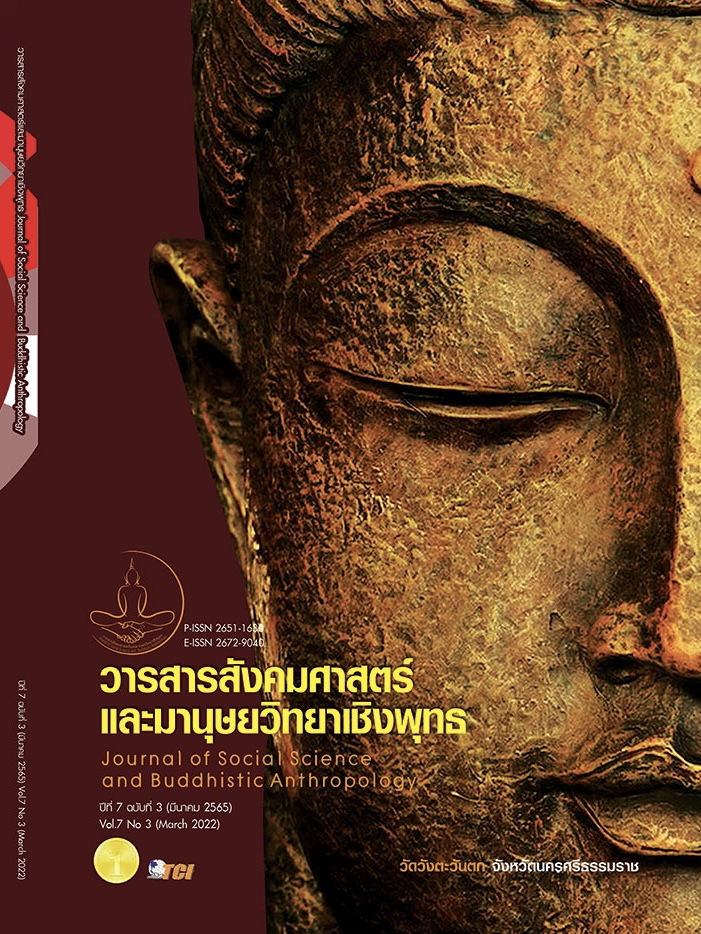A CONFIRMATORY FACTOR ANALYSIS OF GROWTH MINDSET FOR STUDENT TEACHERS
Keywords:
Confirmatory Factor Analysis, Growth Mindset, Teacher StudentsAbstract
The objectives of this research article were to 1) Study the Factors of a growth mindset. 2) Investigation rater agreement index of the composition structure of the growth mindset. This research was a Mixed Methods research. Data were collected by in-depth interview technique with 5 experts and student teachers in private university with 300 person (collect data with questionnaires) by using Stratified Random Sampling. The current research study was conducted by means of an in - depth interview and a survey with the use of interviews and questionnaires. The statistical data analysis is confirmatory factor analyses. The results disclosed the confirmatory factor analyses of growth mindset model consists 5 factors. The factor loadings were 88, .95, .95, .92, and .89 The validation of a goodness of fitted model yielded a Chi-square of 119.86, df = 62, p-value = 0.00001; Relative 2 = 1.93, RMSEA = 0.056, GFI = 0.951, AGFI = 0.905, CFI = 0.986, RMR = 0.008 The model of the growth mindset element of student teachers are consistent with the empirical data. The results is 1) Elements of a growth mindset of student teachers consisted of 5 components is 1.1) Believe about person can learn and develop 1.2) Challenge 1.3) Dare to face failure 1.4) Effort 1.5) Listen and learn criticism. 2) Growth mindset scale of student teachers be appropriate and can measure a growth mindset of student teachers as a guideline for planning the development of a growing thinking set of students in the teaching profession which can be utilized and able to develop students of the teaching profession to have a more growing set of ideas.
References
ธนะดี สุริยะจันทร์หอม. (2561). การพัฒนารูปแบบการเสริมสร้างโกรว์ธ มายด์เซต สำหรับนักศึกษาหลักสูตรวิชาชีพครู. ใน ดุษฎีนิพนธ์ปรัชญาดุษฎีบัณทิต สาขาจิตวิทยาการศึกษาและการแนะแนว. มหาวิทยาลัยมหาสารคาม.
พิณสุดา สิริรังธศรี. (2557). การยกระดับคุณภาพครูไทยในศตวรรษที่ 21. (พิมพ์ครั้งที่ 1). กรุงเทพมหานคร: สำนักงานส่งเสริมสังคมแห่งการเรียนรู้และคุณภาพของเยาวชน.
วิโรจน์ ลักขณาอดิศร. (2559). พฤติกรรม 9 อย่างของพ่อแม่ ที่งานวิจัยระบุว่า "ทำให้ลูกพบกับความล้มเหลว". เรียกใช้เมื่อ 27 ตุลาคม 2563 จาก https://www.facebook.
com/education.facet/posts/1106118612793406/
สำนักนโยบายและยุทธศาสตร์ สำนักงานปลักกระทรวงศึกษาธิการ. (2559). แผนพัฒนาการศึกษาของกระทรวงศึกษาธิการ พ.ศ. 2560 - 2564. กรุงเทพมหานคร: โรงพิมพ์สำนักงานปลัดกระทรวงศึกษาธิการ กระทรวงศึกษาธิการ.
Annie, B. & Heather, H. (2016). The Growth mindset coach There’s a difference between not knowing and not knowing yet. Berkeley, CA: Ulysses Press.
Comrey, A. L. & Lee, H. B. (1992). A First Course in Factor Analysis. (2nd ed). Hillsdale, New Jersey: Lawrence Erlbaum Associated.
Dweck, C. S. (2006). Mindeset: The new psychology of success. New York: Random House.
Dweck, C. S. (2012). Mindset: How You Can Fulfil Your Potential. Lodon: Constable & Robinson Limited.
Esparza, J. et al. (2014). Growth mindset of gifted seventh grade students in science. NCSSSMST Journal, 19(1), 6-12.
Hair, J. F. et al. (2010). Multivariate Data Analysis. (7th ed). Pearson: New York.
Mangels, J. A. et al. (2006). Why Do Beliefs About Intelligence Influence Learning Success? A Social Cognitive Neuroscience Model. Social Cognitive and Affective Neuroscience, 1(2), 75-86.
Downloads
Published
How to Cite
Issue
Section
License
Copyright (c) 2022 Journal of Social Science and Buddhistic Anthropology

This work is licensed under a Creative Commons Attribution-NonCommercial-NoDerivatives 4.0 International License.









